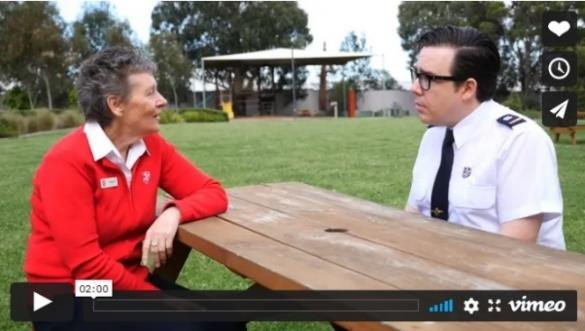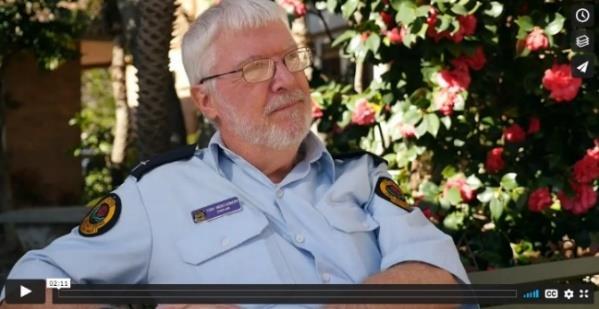
7 minute read
Course Structure
Delivery Mode Online, Classroom + Work Placement & Pastoral Supervision
Duration Two years
Enrolment Intakes
Melbourne 8-19 February
Sydney 22 February-5 March
Brisbane 29 March - 9 April
Perth 12-23 April
Intensives Dates vary depending on state. Visit the website for more details.
Course Coordinator
Joanne Trevethan
joanne.trevethan@salvationarmy.org.au
Course Trainers
Major Tracey English has worked as a Salvation Army officer (minister) for more than 30 years. During this time she has been involved in parish work, teaching pastoral care at The Salvation Army theological college and writing and editing Salvation Army publications. Most recently, Tracey has been working in the area of chaplaincy, initially as a chaplain within Salvation Army social programs, providing pastoral care to program staff and clients experiencing homelessness, mental health and addiction issues. Tracey has also worked as a chaplaincy team leader for courts and prison chaplains in Melbourne, represented The Salvation Army at Corrections Victoria and been on the board of Spiritual Health Association, an organisation dedicated to the development and delivery of spiritual car in hospitals.
Tracey is a pastoral care representative on the Human Research Ethics Committee at the Royal Childrens Hospital in Melbourne.
Tony Montgomery is most excited about equipping Chaplains with the skills and tools to work effectively in the community, while making sure they take care of themselves spiritually, mentally, and physically. He trained as an Emergency Services Chaplain at the Police & Fire Chaplains Academy in Seattle Washington. He works with the NSW State Emergency Services, where he is regularly called out to conduct both individual welfare checks and debriefs for large scale emergencies. His chaplaincy experience also includes: Aged care (Anglican Retirement Villages), Mission to Seafarers, Community Chaplain (Anglicare) and Correctional Services (Oberon Correctional Centre for young offenders).

Course Structure The 10635NAT Diploma of Chaplaincy is a competency-based course which requires 14 units for the qualification (10 core units and 4 elective units).
CORE UNITS CHAMIN001 CHAMIN002 CHAMIN003 CHAPPD001 CHCCCS003 CHCCCS017 CHCCOM002 CHCDFV007 CHCDIV001 CHCMHS001 Provide chaplaincy services in response to spiritual and religious needs Apply theological concepts in the context of client’s needs and beliefs Provide pastoral interventions to people experiencing crisis reactions Implement holistic personal and professional development Increase the safety of individuals at risk of suicide Provide loss and grief support Use communication to build relationships Work with users of violence to effect change Work with diverse people Work with people with mental health issues
RECOMMENDED ELECTIVES CHCPAS001 Plan for the provision of pastoral and spiritual care CHCPAS002 Provide pastoral and spiritual care
ELECTIVES CHCADV002 CHCAGE001 CHCAGE005 CHCDFV001 CHCGRP002 CHCYTH001
Select any two of the online units below to meet your preferred Chaplaincy context Provide advocacy and representation services Facilitate the empowerment of older people Provide support to people living with dementia Recognise and respond appropriately to domestic and family violence Plan and conduct group activities Engage respectfully with young people
Intensives Three face to face intensive classes will be held throughout the year. These intensives provide an opportunity for students to connect with their trainer and cohort as well as practice the skills needed as a chaplain. The intensives include daily lunch and refreshments.
Chaplaincy Foundations Explore what it means to be a chaplain and the foundational skills and knowledge required. Learn how to care for yourself and provide pastoral and spiritual care to others.
Inclusive Chaplaincy Be equipped as a chaplain to support a wide range of people with differing needs and beliefs. Delve into how to support those suffering loss and grief.
Chaplaincy in Times of Crisis Learn how to work with people who are experiencing times of crisis or have experienced a crucial life changing incident. Engaging with such vulnerable people requires sensitivity and the discerning application of extensive knowledge and skills.
Tracey English Trainer and Assessor of Diploma of Chaplaincy

“I enjoy being a trainer and providing classroom teaching; standing in front of people and being able to see the light go on or see them join the dots as they train to work in the field of Chaplaincy is such an honour.
Working in the area of chaplaincy is a great privilege, to come alongside people when they are vulnerable and to hold their story and provide support, is amazing!”
Work Placement Whether you are already working as a Chaplain or are looking to move into the field, work placement will give you an invaluable opportunity to put your course theory into practice. Successful completion of this course requires 140 hours work placement in the chaplaincy field. It may be possible to undertake your placement on-the-job if you are working in a suitable role in the sector. If you are not currently working in the industry, you have the flexibility of identifying a placement or our Placement Officer can assist you to locate a suitable work placement. Due to the ever-changing demands placed on organisations it is not possible for the college to guarantee a suitable placement. For further information email the Course Coordinator.
Pastoral Supervision Working in the chaplaincy field may expose you personally to distressing situations, for example vehicle accidents with the emergency services, aggressive persons in correctional centres and victims of violence in the community. It is important that Chaplains have both formal support (work, pastoral supervision, EAPs, etc) and informal support (family, friends, faith group, etc) for the times when you may need assistance to recover. Therefore, successful completion of this qualification includes 10 hours of pastoral supervision (with a qualified supervisor) at the student’s arrangement and cost. Your trainer can provide guidance regarding accessing suitable pastoral supervision.
Competency-based training Competency is the consistent application of knowledge and skill to the standard of performance required in the workplace. As this is a competency-based course, the assessments will involve the demonstration of skill, knowledge and the ability to work consistently to the standards required. The assessment tasks may include questioning, case studies, third party feedback or workplace projects.
Recognition of Prior Learning (RPL) If you believe you have the skills and knowledge in some or all of the units, or you already hold a similar qualification and are looking to upgrade, then you may wish to consider Recognition of Prior Learning (RPL).
Recognition for modules/units may be granted based on previous learning, studies, work and/or life experiences. RPL is available to all learners and the RPL application process should start upon application, and preferably be completed before you begin your studies. RPL information and fees are available on application. Please discuss this with the Course Coordinator when you enrol.
Credit Transfers A credit transfer provides automatic credit for units you have already completed in an accredited course with another training provider. There is no charge for credit transfers, and your course fees will be reduced if you are eligible. Please discuss this with the Course Coordinator when you enrol.
Eva Burrows College Vocational Training is committed to providing the best quality support. We care about your learning and offer services and facilities to ensure you are supported in your studies. Our friendly staff, trainers and librarians are here to assist you access a broad range of support services, online learning communities and course advice that both informs and inspires your learning.
Course Materials and Resources
Trainer and Assessor To support and guide you in your learning Eva Burrows College has trainers and assessors who are qualified and currently working in their industry, thereby providing you with the most up to date knowledge and skills to support and guide your learning.
Each topic of your learning journey commences with an introduction to the subject matter, followed by forums, quizzes, and facilitation. At any stage of your learning you can contact your trainer by email, who is available to help you with your query.
Booth Online The login instructions for the online portal will be provided after enrolment.
Learner Guides Learner Guides will be made available to you after enrolment. Access to supplementary learning materials and assessment tasks will be available through our online portal, Booth Online. Our Online Support Team is available Monday to Friday to assist you to navigate the system and can be contacted via email at online@ebc.edu.au.
Eva Burrows College will provide you with a Learner Guide for each unit, to enable you to advance your knowledge of each topic. These will be provided to you at each intensive class.
Eva Burrows Library Can provide additional resource material on request. The Eva Burrows Library offers both onsite and online access to resources that help meet the study, research and leisure reading needs of our students. To become a member of the library, please complete the Library Registration Form



